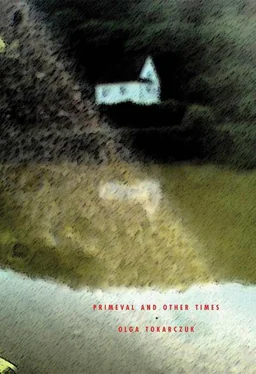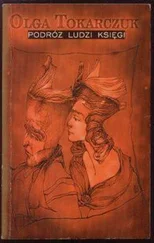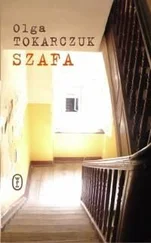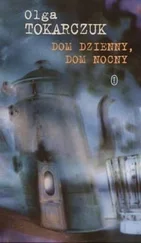So in its confusion Dipper’s soul thought that it was still Dipper.
In time, a sort of disappointment and dislike of everything human was born in Dipper’s soul. Some remains of old, human or even animal thoughts were tangled in it, some memories and images. So it believed it would re-enact the moment of disaster, the moment of Dipper’s or someone else’s death, and that this would help it to become free. That was why it wanted so badly to startle some other horses, overturn a cart and drown a person. So from the soul of Dipper the Drowned Man was born.
The Drowned Man chose as his headquarters a forest pond with a dike and a little bridge, and also the entire forest called Wodenica, and the meadows from Papiernia all the way to Wydymacz, where the mist could be especially dense. Mindless and vacant, he roamed his estates. Only sometimes, when he met a man or an animal, was he animated by a sense of anger. Then his enduring took on meaning. He would do his best at any price to cause whatever creature he encountered some evil, lesser or greater, but an evil.
The Drowned Man was always discovering his own potential anew. At first he thought he was weak and defenceless, that he was something like a flurry of wind, a light haze or a puddle of water. Then he discovered that he could move faster than anyone could imagine, just by thought alone. He thought about a place, and at once he could be there, in a flash. He also discovered that the mist obeyed him, and that he could control it as he wished. He could take strength from it, or a shape, he could move entire clouds of it, block out the sun with it, blur the horizon and extend the night. The Drowned Man realised that he was the King of the Mist, and from then on that was how he started to think of himself – the King of the Mist.
The King of the Mist felt best under water. For years on end he lay under its surface on a bed of silt and rotting leaves. From under the water he watched the changing seasons and the movements of the sun and the moon. From under the water he saw the rain, the leaves falling in autumn, the dances of summer dragonflies, people bathing, and the orange feet of wild ducks. Sometimes something woke him from this sleep-non-sleep, sometimes not. He never wondered about it. He just endured.
Old Boski spent his entire life on the manor house roof. The manor house was large, and its roof enormous – full of slants, slopes, and edges. And entirely covered in beautiful wooden shingle. If you were to straighten out the manor house roof and spread it on the ground, it would cover the entire field that Boski owned.
Boski left the cultivation of this land to his wife and children – he had three girls and a boy, Paweł, handsome and capable. Each morning Old Boski went up onto the roof and replaced the rotting or mouldering shingles. His work had no end. Nor did it have a beginning, because Boski did not start from a specific spot and did not move in a specific direction. On his knees he examined the wooden roof metre by metre, shifting here and there.
At noon his wife brought him his dinner in a double pot. In one container there was rye soup, in the other potatoes, or buckwheat with fried crackling and buttermilk, or cabbage and potatoes. Old Boski didn’t come down for dinner. He was handed the double pot on a rope in the bucket in which the wooden shingles went up.
Boski ate, and as he chewed he looked at the world around him. From the manor roof he saw meadows, the Black River, the roofs of Primeval, and tiny human figures, so small and fragile that Old Boski fancied blowing on them and sweeping them off the world like refuse. At this thought he would stuff another helping of food into his mouth, and on his weather-beaten face a grimace would appear that may have been a smile. Boski liked this moment of each day, when he imagined people being blown about in all directions. Sometimes he imagined it slightly differently: his breath became a hurricane, tearing the roofs off houses, knocking over trees and cutting down orchards. Water would flood into the plains, and people would hurry to build boats to save themselves and their property. Craters would appear in the earth, from which pure fire would burst forth. Steam would blast into the sky from the battle between fire and water. Everything would shake in its foundations and finally cave in like the roof of an old house. People would stop mattering – Boski would destroy the entire world.
He swallowed his mouthful and sighed. The vision evaporated. Now he rolled himself a cigarette and looked closer, at the manor courtyard, the park and the moat, the swans and the pond. He would stare at the carriages driving up, and later the cars. From the roof he saw ladies’ hats and gentlemen’s bald patches, he saw the squire coming home from a horseback ride and the squire’s wife, who always took tiny little steps. He saw the young lady, fragile and delicate, and her dogs, which inspired terror in the village. He saw the eternal traffic of lots of people, their greeting and parting gestures and facial expressions, people coming in and going out, talking to each other and listening.
But what did they matter to him? He would finish smoking his roll-up, and his gaze would stubbornly return to the wooden shingles, to settle on them like a freshwater mussel, to savour and feed on them. And at once he would be thinking how to trim and cut them – and so his dinner break came to an end.
His wife would fetch the double pot, which he let down on the rope, and go home across the meadows to Primeval.
Old Boski’s son Paweł wanted to be someone “important.” He was afraid that if he didn’t start to take action soon, he would become as “unimportant” as his father and would spend his whole life putting shingles on a roof. So when he turned sixteen, he got out of the house where his ugly sisters reigned supreme and found himself a job in Jeszkotle working for a Jew named Aba Kozienicki, who traded in wood. At first Paweł worked as an ordinary woodcutter and loader, but Aba must have liked him, because he soon entrusted him with the responsible job of marking and grading the tree trunks.
Even in grading wood Paweł Boski always looked to the future – the past didn’t interest him. The very thought that you could shape the future, and have an influence on what would happen, excited him. Sometimes he wondered how it all comes about. If he had been born in the manor as a Popielski, would he have been the same as he was now? Would he have thought the same way? Would he still have liked Misia, the Niebieskis’ daughter? Would he still have wanted to be a paramedic, or would he have aimed higher – doctor, university professor?
One thing the young Boski was sure of – knowledge. Knowledge and education were wide open to everyone. Of course it was easier for others, all those Popielskis and such like. And it wasn’t fair. But on the other hand he, too, could learn, though it would take greater effort, because he had to earn a living and help his parents.
So after work he went to the district library and borrowed books. The district library was poorly stocked. It lacked encyclopaedias and dictionaries. The shelves were full of things like The Kings’ Daughters and Without a Dowry – books for women. At home he hid the library books from his sisters in his bed. He didn’t like them touching his things.
All three sisters were big, solid, and coarse. Their heads looked small. They had low brows and thick fair hair, like straw. The prettiest of them was Stasia. When she smiled, her white teeth flashed in her tanned face. She was a bit disfigured by her awkward, waddling feet. The middle one, Tosia, was already engaged to a farmer from Kotuszów, and Zosia, large and strong, was supposed to be leaving any day for domestic service in Kielce, the big city. Paweł was glad they were leaving home, though he disliked his home as much as he disliked his sisters.
Читать дальше












